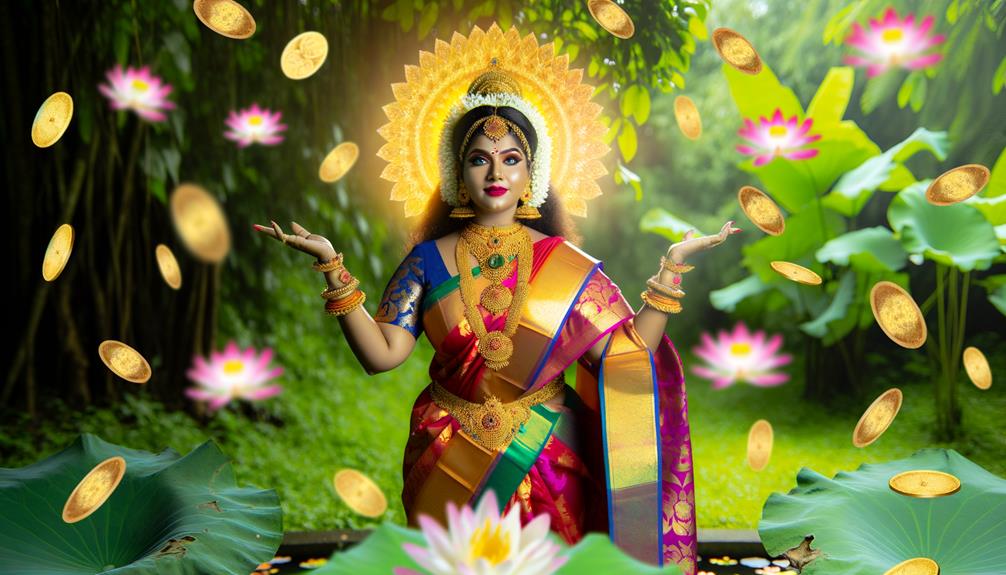Meaning of the Name Lakshmi
The name Lakshmi originates from Sanskrit, denoting perception and understanding. Deeply rooted in Vedic texts and Hindu mythology, Lakshmi symbolizes wealth and prosperity.
Revered as the consort of Vishnu, her iconography frequently includes lotus flowers and gold coins, representing purity, spiritual wealth, and material affluence. Celebrated in rituals such as Diwali, she embodies fertility, fortune, and auspiciousness.
Her association with Vishnu underscores her role in maintaining cosmic balance. The name transcends cultural boundaries, remaining a popular choice symbolizing prosperity and grace.
Further exploration reveals her profound cultural and historical significance.

Key Takeaways
- The name Lakshmi originates from the Sanskrit word 'Lakṣmī,' meaning 'to perceive, observe, know, understand.'
- Lakshmi symbolizes wealth, prosperity, and fortune in Hindu mythology, often depicted with gold coins and lotus flowers.
- She is the consort of Vishnu, representing material affluence, spiritual well-being, and purity.
- Lakshmi is celebrated during festivals like Diwali, where she is invoked for blessings of abundance and harmony.
- The name reflects a rich cultural heritage, popular in modern India and among the global Indian diaspora.
Etymology and Origins
The name Lakshmi originates from the Sanskrit word 'Lakṣmī,' which can be traced back to the root 'lakṣ,' meaning 'to perceive, observe, know, understand,' and is deeply embedded in ancient Vedic texts and Hindu mythology.
In the Vedic period, Lakshmi was initially associated with material wealth and prosperity, reflecting the agrarian society's dependence on the harvest and cattle. The Rigveda, one of the oldest known scriptures, references her as a symbol of auspiciousness and abundance.
Over centuries, the term evolved, incorporating broader connotations of fortune and beauty. This etymological journey highlights Lakshmi's evolution from a Vedic abstraction to a central figure in Hindu culture, embodying both spiritual and material prosperity.
Lakshmi in Hindu Mythology
In Hindu mythology, Lakshmi epitomizes wealth and prosperity, revered as the consort of Vishnu, the preserver among the trinity of Hindu gods.
Her iconography, often depicted with gold coins and lotus flowers, symbolizes not just material affluence but also spiritual well-being and purity.
Historically, the veneration of Lakshmi has been integral to rituals and festivals such as Diwali, where she is invoked to bestow fortune and harmony upon households.
Goddess of Wealth
Among the pantheon of Hindu deities, Lakshmi holds a paramount position as the goddess of wealth, prosperity, and fortune, deeply revered since ancient Vedic times. Her origins trace back to the Rigveda, where she is mentioned as Sri, embodying fertility and prosperity.
Lakshmi is often depicted seated on a lotus, symbolizing purity and spiritual power, and is accompanied by elephants, representing royal authority and auspiciousness. Her association with Vishnu, the preserver god, underscores her role in sustaining life and cosmic order.
Cultural rituals, especially during Diwali, are dedicated to invoking her blessings for material and spiritual abundance. Historically, Lakshmi's veneration has transcended regional barriers, signifying her integral presence in the socio-economic fabric of Hindu society.
Symbol of Prosperity
Frequently invoked in rituals and prayers, Lakshmi's symbolism as the embodiment of prosperity permeates Hindu mythology, reflecting her enduring influence across various cultural and historical contexts.
Lakshmi is often depicted seated on a lotus, signifying purity and spiritual power—a foundation for material wealth. Her association with the harvest and grains underscores her role in agricultural societies as a provider of sustenance.
Historical texts like the Rigveda and epic narratives such as the Mahabharata emphasize her blessings as essential for well-being and success. Festivals like Diwali celebrate Lakshmi's presence, encouraging devotees to seek her favor for financial and spiritual prosperity.
This portrayal solidifies her status as a pivotal figure in the Hindu pantheon, representing abundance and fortune.
Associated With Vishnu
Lakshmi's deep connection with Vishnu, one of the principal deities in Hindu mythology, underscores her integral role in the cosmic order, where she embodies the sustaining and nurturing aspects of his divine functions. Within the mythological framework, Lakshmi is often depicted as Vishnu's consort, symbolizing wealth, fortune, and prosperity.
Historical texts like the Vishnu Purana and the Mahabharata emphasize her role in preserving dharma (cosmic law) alongside Vishnu. Culturally, their union is seen as a divine partnership that maintains balance in the universe.
During Vishnu's incarnations, such as Rama and Krishna, Lakshmi incarnates as Sita and Rukmini respectively, highlighting her eternal association and support in his divine missions. This synergy illustrates their complementary and interdependent divine roles.
Symbolism and Iconography
In the rich tapestry of Hindu mythology, the symbolism and iconography associated with Lakshmi are deeply intertwined with the cultural and historical understanding of prosperity, wealth, and purity.
Lakshmi is often depicted seated or standing on a lotus flower, symbolizing spiritual enlightenment and purity. Her four hands represent the four goals of human life: dharma (righteousness), artha (wealth), kama (desires), and moksha (liberation).
The gold coins flowing from her hands signify unending material and spiritual prosperity. Elephants flanking her symbolize royal power and auspiciousness, often depicted showering her with water, indicating the continuous flow of blessings.
This imagery has been meticulously crafted over centuries, reflecting the integral role Lakshmi plays in the spiritual and material domains of Hindu culture.
Cultural Significance
The rich symbolism and iconography surrounding Lakshmi extend beyond visual representation, deeply embedding her presence in the cultural fabric of Hindu society, where she is revered not only as a deity of wealth but also as a cornerstone of household and communal rituals.
Historically, Lakshmi's significance can be traced to ancient Vedic texts, where she symbolizes prosperity, fertility, and purity. Her worship during Diwali, the festival of lights, underscores her role in bringing auspiciousness and well-being to homes. Rituals such as Lakshmi Puja, performed in households and businesses, highlight her integral role in daily life.
Additionally, historical records suggest that she has been invoked for blessings in agriculture and trade, emphasizing her pervasive influence across various aspects of society.
Modern-Day Relevance
In contemporary society, the name Lakshmi retains significant cultural importance, symbolizing prosperity and auspiciousness across various communities.
Its influence is evident in popular media, where characters named Lakshmi often embody virtues linked to the goddess, thereby perpetuating traditional values.
Additionally, the name remains prevalent in modern naming trends, reflecting its enduring appeal and the continued reverence for its historical and mythological roots.
Contemporary Cultural Significance
Although rooted in ancient tradition, the name Lakshmi continues to hold profound cultural and spiritual significance in contemporary society, symbolizing wealth, prosperity, and well-being across various communities globally.
In modern India, Lakshmi is invoked during Diwali, a festival celebrating light and prosperity, underscoring her lasting impact.
Beyond Indian borders, the name and its associated values are embraced by diasporic communities, reflecting a blend of traditional reverence and contemporary aspirations.
Historically, Lakshmi has been a central figure in Hinduism, often depicted with attributes symbolizing abundance and purity.
Today, this reverence extends into business practices, where invoking Lakshmi is believed to bring financial success and ethical prosperity, blending ancient spirituality with modern economic endeavors.
Influence in Popular Media
Popular media today often incorporates the name Lakshmi, reflecting its enduring cultural resonance and multifaceted symbolism in narratives that explore themes of prosperity, virtue, and spiritual fulfillment.
Films and television series, particularly within Indian cinema, frequently feature characters named Lakshmi, often embodying the qualities of the goddess herself—abundance, grace, and moral integrity. This trend can be traced back to mythological storytelling traditions where Lakshmi represents the ultimate feminine ideal.
Additionally, contemporary literature and digital media leverage the name to evoke a sense of cultural depth and historical continuity. By integrating Lakshmi into various media forms, creators connect with audiences on a profound level, bridging ancient cultural heritage with modern-day storytelling.
Name Trends Today
Reflecting its rich cultural heritage and timeless importance, the name Lakshmi continues to be a popular choice for newborns in modern India and among the global Indian diaspora, symbolizing prosperity and spiritual grace in current naming trends. The enduring appeal of the name can be attributed to its deep-rooted connection with the Hindu goddess of wealth and fortune, Lakshmi. This venerated deity's influence guarantees that the name remains relevant, transcending temporal shifts and geographical boundaries.
```markdown
| Region | Popularity Rank | Cultural Significance |
|---|---|---|
| India | Top 10 | Traditional and religious reverence |
| USA | Top 1000 | Cultural heritage |
| UK | Top 500 | Spiritual symbolism |
| Canada | Top 800 | Diverse cultural acceptance |
| Australia | Top 700 | Embracing multiculturalism |
```
This table highlights the name's contemporary popularity and cultural resonance across different regions.
Lakshmi in Literature
In literature, the name Lakshmi is intricately woven into narratives that explore themes of prosperity, fortune, and divine benevolence, reflecting the goddess's profound cultural and historical significance in Hindu mythology. Texts like the Rigveda and the Mahabharata illustrate her as the embodiment of wealth and purity.
Lakshmi's presence in epic tales signifies not just material wealth but also spiritual and moral prosperity. In classical Sanskrit literature, she is often depicted as the consort of Vishnu, symbolizing the harmonious balance between power and benevolence.
Her influence extends into modern literary works, where she represents the enduring values of abundance and well-being, serving as a crucial cultural touchstone that illuminates the perpetual quest for a prosperous and virtuous life.
Names Derived From Lakshmi
How does the cultural reverence for the goddess Lakshmi manifest in the myriad of names derived from her, each echoing attributes of prosperity, grace, and divine fortune?
In Indian tradition, names like 'Sridevi,' 'Padma,' and 'Kamala' are common, all signifying aspects of Lakshmi. 'Sridevi' combines 'Sri,' meaning wealth, with 'Devi,' meaning goddess, honoring her divine status. 'Padma' and 'Kamala' both refer to the lotus, a symbol of purity and prosperity associated with Lakshmi.
Historically, these names have been used to invoke her blessings in everyday life. Inscriptions and ancient texts frequently reference these names, reinforcing their cultural significance. This tradition reflects a deep-seated desire to imbue personal identity with divine virtues.
Conclusion
Like a resplendent lotus blossoming in a serene lake, the name Lakshmi unfurls layers of rich history, deep cultural significance, and enduring relevance.
Rooted in ancient texts and celebrated through intricate iconography, Lakshmi's essence permeates literature and everyday life.
The name, far from being a mere label, serves as a beacon of prosperity, wisdom, and divine grace, illuminating paths across centuries and civilizations.
The study of Lakshmi therefore offers a panoramic view of a timeless cultural tapestry.






